Blog Posts Tagged MEMS Module
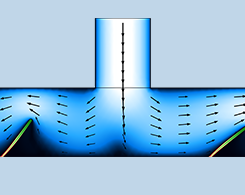
Simulating a Valveless Micropump Mechanism
Valveless micropumps are integral to many microfluidic systems. Simulation can be used to study the fluid–structure interaction occurring in these components to improve their performance.

Model Variations of a Comb-Drive Tuning Fork Rate Gyroscope
Explore 3 gyroscope models to see the benefits of equation-based modeling, how modeling can capture the impact of manufacturing variations, and more.

Modeling Electromigration in COMSOL Multiphysics®
Computers, smartphones, and other devices rely on integrated circuits. Over time, an interconnect can experience damage due to electromigration. Explore how to model this phenomenon here.
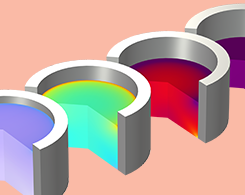
Simulating the Pharmaceutical Tableting Process
Powder compaction is widely used in the pharmaceutical industry due to its high flexibility and control over quality. Here, we explore this process with the Capped Drucker-Prager model.
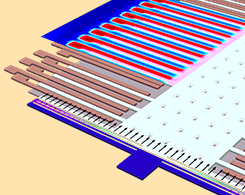
Simulating MEMS Accelerometers and Gyroscopes Used in Inertial Measurement Units
Many autonomous vehicles rely on IMUs for navigation. Here, we show how the MEMS Module can help you model the gyroscopes and accelerometers used in IMUs.
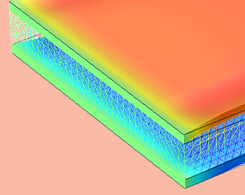
Modeling Piezoelectricity: Which Module to Use?
Acoustics Module, MEMS Module, Structural Mechanics Module: Which one should you use for your piezoelectric device modeling? Get a comprehensive overview of your options here.
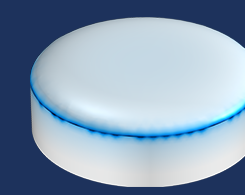
Curve Fitting of Solution Data in COMSOL Multiphysics®
We discuss curve fitting of continuous solution data, the concept of orthogonality, and how to fit solution data to a set of orthogonal functions for a simple and convenient postprocessing operation.
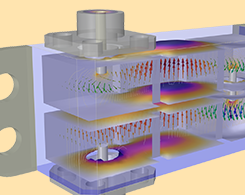
Designing Cavity Filters for 5G Devices with Multiphysics Modeling
From radar and microwave ovens to particle accelerators, RF cavity filters are found in a variety of different application areas. Among them: 5G devices and infrastructure.
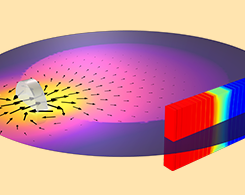
How to Model a Hall Effect Sensor with COMSOL Multiphysics®
Basic working principle of a Hall effect sensor: A nearby magnetic field deflects the path of current through a semiconductive sensor, which causes a measurable change in potential.
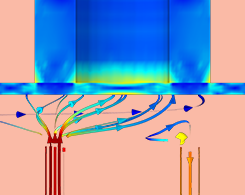
How to Simulate a Piezoelectric Micropump
Learn how to combine piezoelectric materials with fluid-structure interaction effects, use a velocity-dependent formula, and set up disconnected mesh between the solid and fluid domains.
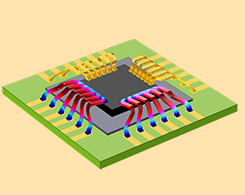
Course: Modeling Joule Heating with Thermal Expansion
Get an overview of the course on Joule heating and thermal expansion. Plus, access supporting material.
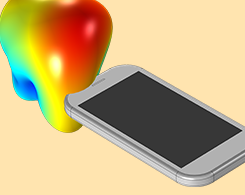
Computational Electromagnetics Modeling: Which Module to Use?
If you work with a particular electromagnetic device or application area, you might be wondering which module in the COMSOL product suite is right for you. Keep reading for a comprehensive intro.
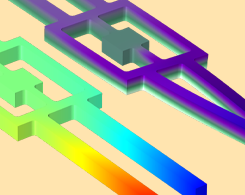
Modeling a Double-Tuning-Fork MEMS Gyroscope
Piezoelectric rate gyroscopes and similar MEMS devices offer an affordable way to measure angular velocity in applications such as skid control and rollover detection in automobile systems.
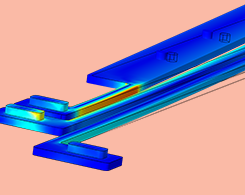
Performing a Multiphysics Analysis of a Thermal Microactuator
To design an optimized thermal microactuator for use in a specific device, you need to account for tightly coupled electrical, thermal, and structural phenomena in your analysis.
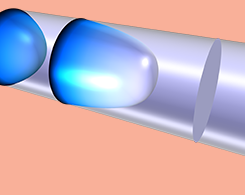
Hydrodynamic Thermal Transport in the Kinetic-Collective Model
F. Xavier Alvarez from the Universitat Autònoma de Barcelona (UAB) discusses using COMSOL Multiphysics® to model heat transfer at the nanoscale and better understand transport processes.
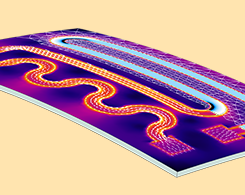
Designing Heating Circuits with Multiphysics Simulation
The electronic message boards you see on the highway contain heating circuits. Their design is a truly multiphysics problem involving heat transfer, structural mechanics, and electromagnetics.
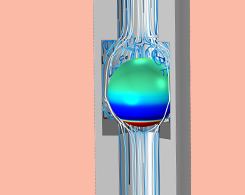
Simulating Fluid-Structure Interaction in a Ball Check Valve
Simulate FSI in a ball check valve to find the flow rate, fluid pressure, and fluid velocity. The COMSOL® software includes a predefined multiphysics coupling that makes it simple.
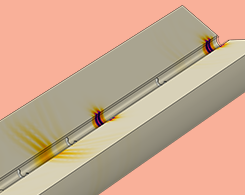
How to Model Piezoelectric Devices as Both Transmitters and Receivers
Certain types of transducers can act as both transmitters and receivers. We demonstrate how to use 2 features for modeling this type of piezoelectric device.

How to Activate Material in Simulations of Manufacturing Processes
Do you model manufacturing processes such as welding or additive manufacturing? You can activate or deactivate a material in a material deposition simulation using specialized functionality.
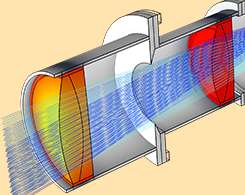
How to Perform a STOP Analysis with COMSOL Multiphysics®
Interested in structural-thermal-optical performance (STOP) analysis? We go over the theory, background, and how to perform such an analysis in the Ray Optics Module.

High-Fidelity Modeling of a Tunable Filter via Multiphysics Simulation
Tunable cavity filters can enhance the development of high-speed, wireless communication networks. To optimize these devices for such a purpose, we can turn to high-fidelity modeling.

Analyzing a MEMS-Based Strain Gauge Design with Simulation
MEMS-based strain gauges are helpful in both civil engineering and biomedicine. Read about a team of researchers who used the MEMS Module to analyze strain gauge designs.
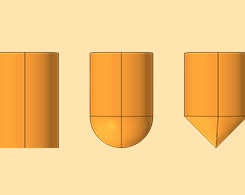
Analyzing Kelvin Probe Designs with COMSOL Multiphysics®
Kelvin probes, a type of MEMS technology, provide a nondestructive and contact-free way to measure the work function differences of various material combinations.
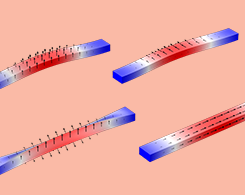
How to Analyze Eigenfrequencies That Change with Temperature
In certain scenarios, such as in the MEMS field, the eigenfrequencies of a device can change with temperature. Here’s a guide to studying temperature-dependent eigenfrequencies.
